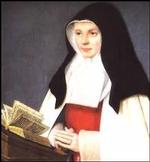Catholic Activity: St. Columba Oat Cakes
St. Columban, abbot, is the patron of shepherds, and one of the patron saints of Scotland. The tradition of rye or oat cakes baked in his memory is described by Florence Berger.
St. Columba's feast no longer appears on the General Roman Calendar, but June 9 is a Feast Day in Ireland's National Calendar: Saint Columba (Colum Cille), Abbot and Missionary, Secondary Patron of Ireland.
DIRECTIONS
There is a story which is told at this time of the year about the little children of northern Scotland, and our children of southern Ohio love to hear it. How easily we are united in brotherhood by common interest! As June 8, the eve of St. Columba's Day, arrives, our green hills are flicked with puffs of white wool. The older sheep have been sheared, but the fat little ones are as broad as they are long. The newborn ewe lambs have learned to skip and dance, while the young rams pretend to be very fierce as they bump their curly heads in play.
Just so the hills of the Hebrides must have looked when St. Columba and his twelve companions arrived in Scotland away back in the sixth century. The people were called Picts at that time and their lives depended upon sheep raising. It was an easy step for them to understand the message of the Good Shepherd. St. Columba, in imitation of his Master, gathered Scotland's souls to himself, gave them a sheepfold of faith in the island Monastery of Iona. As a "faithful and wise servant, whom his Lord setteth over his family, he gaveth them their measure of wheat in due season." It is true that he died at the foot of the altar while he was blessing "his sheep" in about the year 600, but some of his people remember him still. Even today a rye or oat cake is baked in the Hebrides in honor of St. Columba, the shepherd of souls. A small silver coin is placed in the dough, and the cake is toasted before a fire of rowan, yew or oak branches. The children of the house dance in impatience until the cake is finished because it is theirs and theirs alone. Excitement rises to a fever pitch when the cake is divided, for the child who receives the silver coin has always gotten the crop of new lambs for the season. Families did know how to delegate authority before the days of 4-H groups. You see, young shepherds are trained on actual hills and on actual responsibility.
Activity Source: Cooking for Christ by Florence Berger, National Catholic Rural Life Conference, 4625 Beaver Avenue, Des Moines, IA 50310, 1949, 1999






